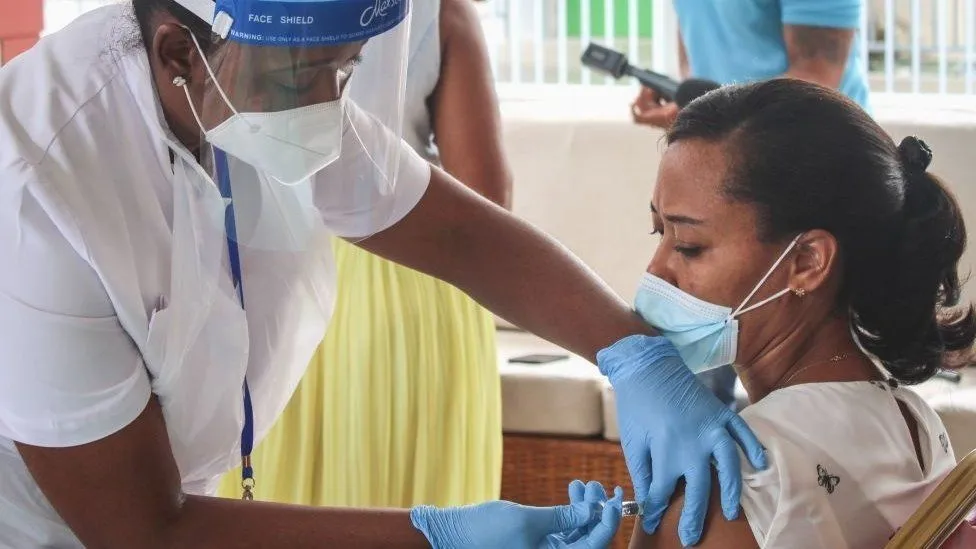塞舌尔疫情反弹引发对国药疫苗有效性质疑
这个人口刚刚超过10万的小岛国现在正与新冠病毒感染的激增作斗争,不得不重新采取限制行动的措施。
|1 min read

<p><i>By:Sui Lee Wee (New York Times)</i></p> <p>在塞舌尔一家电话服务中心工作的玛丽·内芝(Marie Neige)非常想接种疫苗。与这个小岛国的大多数居民一样,她已在今年3月打了中国国药集团的疫苗,正期待着几周后疫苗将提供的充足保护。</p>周日,她的新冠病毒检测呈阳性。 <p>“我大吃一惊,”30岁的内芝说道,她目前在家中隔离。她表示自己已失去嗅觉和味觉,而且喉咙有点痛。“疫苗本该保护我们——不只是保护我们不被病毒感染,而是保护我们不受这些症状的困扰,”她说。“我一直慎之又慎。”</p> <p>中国曾指望国药集团的疫苗成为它疫苗外交计划的主力,这种易于运输的疫苗不仅可为本国公民,而且可为许多发展中国家的人民提供保护。据追踪中国对全球健康影响的咨询公司<a href="“https://bridgebeijing.com/our-publications/our-publications-1/china-covid-19-vaccines-tracker/#anchor-3“">播锐智咨询(北京)</a>,为了努力争取亲善,中国已向其他国家捐赠了1330万剂国药疫苗。</p> <p>然而,这家已研制生产了两种新冠病毒疫苗的公司却面临着越来越多的关于接种的问题。最初是关于疫苗的后期临床试验数据缺乏透明度。现在,世界上新冠病毒疫苗接种率最高的国家塞舌尔出现了感染病例激增,尽管其大部分人口已接种了国药疫苗。</p> <p>对指望国药疫苗来帮助他们遏制大流行的56个国家来说,这条消息是个挫折。</p> <p>几个月来,公共卫生专家们一直将注意力集中在努力缩小富国与穷国之间获得疫苗的差距上。现在,科学家警告,选择使用有效性相对较低的中国疫苗的发展中国家,到头来可能会落在选择辉瑞(Pfizer)-BioNTech和莫德纳(Moderna)生产的疫苗的国家后面。这个差距可能会让新冠病毒在资源较少的国家继续蔓延。</p> <p>“为了在经济上受益,真的需要使用高效疫苗,否则将不得不与这种疾病长期共存,”澳大利亚悉尼新南威尔士大学(University of New South Wales)柯比研究所(Kirby Institute)生物安全项目负责人雷娜·麦金泰尔(Raina MacIntyre)说。“疫苗的选择很重要。”</p> <p>疫苗选择的后果没有哪个地方比在塞舌尔更明显了,该国已为其60 %以上的人口进行了接种,这在很大程度上依赖的是国药集团的疫苗。这个位于马达加斯加东北、人口刚刚超过10万的印度洋小岛国,正在努力应对新冠病毒的激增,不得不重新采取限制行动的措施。</p> <p>塞舌尔接种了两剂疫苗的人群中,57 %打的是国药疫苗,43 %打的是阿斯利康(AstraZeneca)疫苗。据该国卫生部,在新确诊的感染病例中,有37 %的人已经完成了两剂疫苗的接种,但卫生部没有透露其中有多少人接种的是国药疫苗。</p> <p>“从表面上看,这是一个令人震惊的结果,”澳大利亚墨尔本默多克儿童研究所(Murdoch Children‘s Research Institute)的儿科医生金姆·马尔霍兰(Kim Mulholland)说,他参加过许多疫苗临床试验的监管,包括新冠病毒疫苗的临床试验。</p> <p>马尔霍兰说,来自塞舌尔的初步报告显示,国药疫苗的有效率为50 %,而不是国药集团宣称的78.1 %。</p> <p>“在一个大多数成年人都接种了有效疫苗的国家,我们会期望这种疾病逐渐消失,”他说。</p> <p>科学家说,突破性感染是正常的,因为没有一种疫苗是百分之百有效的。但塞舌尔的经历与以色列的形成了鲜明对比,以色列的新冠病毒疫苗接种率在世界上排名第二,<a href="“https://www.nytimes.com/2021/04/05/world/israel-offers-a-hint-of-what-post-pandemic-life-may-look-like.html“">已有效地遏制了该病毒</a>。一项研究表明,以色列使用的辉瑞疫苗在预防病毒传播上的有效率为94 %。据“用数据看世界”(Our World in Data)项目的统计,本周三,塞舌尔每百万人中的日新增新冠病毒确诊病例为2613.38例,而以色列只有5.55例。</p> <p>塞舌尔总统瓦韦尔·拉姆卡拉旺(Wavel Ramkalawan)<a href="“http://www.seychellesnewsagency.com/articles/14811/President+Ramkalawan+Seychelles+remains+a+safe+destination%2C+vaccination+campaign+effective“">为本国的疫苗接种计划进行了辩护</a>,称国药集团和阿斯利康的疫苗“为我们的人民提供了很好的服务”。他指出,国药疫苗的接种对象是18岁至60岁的人群,在这个年龄段的患者中,80 %需要住院的人没有接种疫苗。</p> <p>“人们可能被感染,但他们并没有生病。只有一小部分人病了,”他对塞舌尔新闻通讯社说。“所以现在发生的情况是正常的。”</p> <p>据塞舌尔新闻通讯社报道,塞舌尔外交和旅游部部长西尔韦斯特·拉德贡德(Sylvestre Radegonde)说,塞舌尔病例激增的部分原因是人们放松了警惕。中国国药集团没有回复记者的置评请求。</p> <p>中国外交部的一名发言人在回答有关《华尔街日报》(The Wall Street Journal)报道的塞舌尔疫情反弹的问题时,指责西方媒体试图抹黑中国疫苗,抱着“‘涉华必黑‘的不健康心态”。</p> <p>世界卫生组织免疫和疫苗主管凯特·奥布莱恩(Kate O‘Brien)在新闻发布会上说,世卫组织正在评估塞舌尔感染病例激增的情况,并称情况“复杂”。上周,世卫组织批准了国药集团的新冠病毒疫苗用于紧急使用,激起了结束全球疫苗供应紧张的希望。</p> <p>她说,“报告的一些病例发生在接种了第一剂疫苗不久后,或接种了第二剂疫苗不久后,或是在第一剂和第二剂接种之间。”</p> <p>奥布莱恩说,世卫组织正在调查塞舌尔目前流行的毒株,感染相对于疫苗接种时间是何时发生的,以及每个病例的严重程度。“只有通过这种评估,我们才能对这些疫苗是否失败作出评价,”她说。</p> <p>但一些科学家说,越来越清楚的是,国药集团的疫苗不能为实现群体免疫提供一个明确途径,尤其是考虑到世界各地正在出现的各种病毒变异时。</p> <p>使用国药集团疫苗的政府“必须假定一个相当高的失败率,并制定相应的计划”,康奈尔大学(Cornell University)的疫苗专家约翰·摩尔(John Moore)说。“政府必须提醒公众,仍有相当大的感染可能。”</p> <p>塞舌尔的许多人说,政府一直不愿意提供信息。</p> <p>“我的问题是:为什么他们推动所有的人去打国药疫苗,”27岁的女服务员戴安娜·卢卡斯(Diana Lucas)说,她5月10日的新冠病毒检测呈阳性。她说,她已在2月10日接种了第二剂国药集团的疫苗。</p> <p>22岁的艾曼纽·霍阿罗(Emmanuelle Hoareau)是一名政府律师,今年3月接种了第二剂国药疫苗,她5月6日的新冠病毒检测呈阳性。“这让人搞不明白,”她说。她还表示,政府没有向公众提供有关疫苗的足够信息。</p> <p>“他们没有向人民解释真实情况,”她说。“这是件大事——很多人都被感染了。”</p> <p>霍阿罗的母亲杰奎琳·皮莱(Jacqueline Pillay)是首都维多利亚一家私人诊所的护士。她说,她认为一种新的变异病毒正在塞舌尔流行,因为近几个月来有大量外国人进入该国。3月25日,这个依赖旅游业的国家向大多数游客开放了边境,而且对来者不进行任何隔离。</p> <p>“人们现在非常害怕,”58岁的皮莱说。“当你向人们提供准确信息时,人们就不会乱猜了。”</p> <p>卫生官员最近在电视上露面,鼓励那些只接种了一剂国药疫苗的人回来打第二剂。但皮莱说,让她失望的是,公共卫生专员没有说明为什么疫苗似乎没有发挥其应有的作用。</p> <p>“我觉得很多人不会回来打第二剂,”皮莱说</p>

